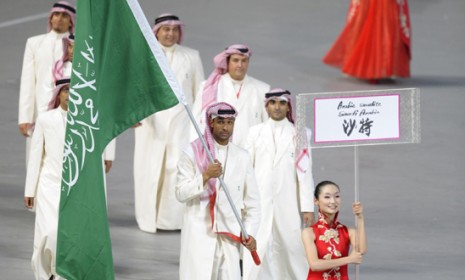Should Saudi Arabia's all-male team be banned from the Olympics?
Human rights activists say the conservative Muslim country should be kicked out of the London Olympics because it won't allow Saudi women to compete

A free daily email with the biggest news stories of the day – and the best features from TheWeek.com
You are now subscribed
Your newsletter sign-up was successful
Activists have launched an internet campaign calling on the International Olympic Committee (IOC) to ban Saudi Arabia from the Summer Olympics in London because the kingdom prohibits Saudi women from competing at the Games — or even participating in organized sports at all. Saudi leaders had hinted that they might let women represent their country for the first time this year, but ultimately decided against it. Human rights activists say the Saudi policy violates Olympic rules against discrimination. So is there a chance Saudi Arabia will be barred from competing? Here, a guide:
Is Saudi Arabia the only team that isn't sending women?
Yes. Two other two holdouts, Qatar and Brunei, had long denied women the right to compete on their Olympic teams, citing cultural and religious reasons, but both caved this year under mounting international pressure. Qatar relented mostly for self-interested reasons — it's bidding to host the 2020 Summer Games. Unlike Saudi Arabia, though, both Qatar and Brunei have sent female athletes to other international competitions, such as the Islamic Women's Games and the Asian Games.
The Week
Escape your echo chamber. Get the facts behind the news, plus analysis from multiple perspectives.

Sign up for The Week's Free Newsletters
From our morning news briefing to a weekly Good News Newsletter, get the best of The Week delivered directly to your inbox.
From our morning news briefing to a weekly Good News Newsletter, get the best of The Week delivered directly to your inbox.
Why is Saudi Arabia holding out?
Every other Muslim and Arab country lets women play sports, simply ensuring that women wear uniforms in accordance with Islamic rules on modesty. But Saudi Arabia is a monarchy with a legal system based on strict interpretation of Islamic law. Its ban on women in sports reflects much broader limits on women's rights. Women can't drive in Saudi Arabia, and King Abdullah only recently agreed to grant them the right to vote — but not even until the 2015 election cycle. Conservative religious clerics don't want the government to ease up on the ban because they say that letting women participate in athletics could put them on the "path of immorality."
Is it the responsibility of Olympic officials to do something?
Technically, yes, activists argue. "It's a black eye to the sporting community to have such an outlier participate in the upcoming Olympics," Christoph Wilcke of Human Rights Watch told The New York Times in February. The Olympic charter prohibits discrimination of any kind, and there's precedent for banning countries that violate the rules. Afghanistan was banned in 1999, in part because it excluded female athletes from its team, and South Africa was banned in the past, too.
A free daily email with the biggest news stories of the day – and the best features from TheWeek.com
But will they?
At this point, it might be too late. Saudi Arabia's "public flirtation" with change fooled the world, says Juliette Kayyem in The Boston Globe. Now it looks unlikely that the IOC could act even if it wanted to. The decision to boot Saudi Arabia out of the Summer Olympics could only be made in a meeting of the full IOC, and there won't be one until after the London games have already begun.
Sources: Boston Globe, Discovery News, Inter Press Service, New York Times
-
 What are the best investments for beginners?
What are the best investments for beginners?The Explainer Stocks and ETFs and bonds, oh my
-
 What to know before filing your own taxes for the first time
What to know before filing your own taxes for the first timethe explainer Tackle this financial milestone with confidence
-
 The biggest box office flops of the 21st century
The biggest box office flops of the 21st centuryin depth Unnecessary remakes and turgid, expensive CGI-fests highlight this list of these most notorious box-office losers